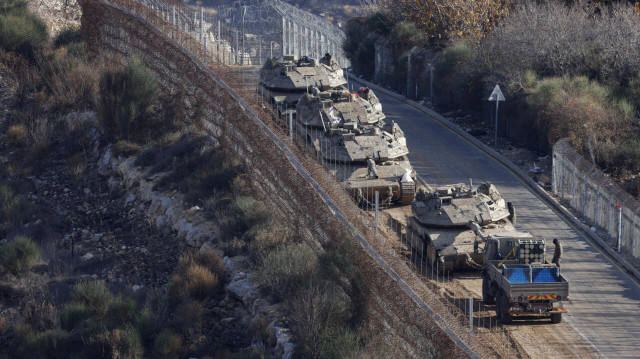
‘Control zone' to extend 9.3 miles into Syria and intelligence ‘influence area' to reach up to 37 miles, according to daily Yedioth Ahronoth
Israel is reportedly planning to establish a "control zone" extending 15 kilometers (9.3 miles) into Syria and an intelligence "influence area" reaching up to 60 km, according to the daily Yedioth Ahronoth on Friday.
The report, citing unnamed Israeli officials, outlined that the Israeli army aims to maintain an operational buffer zone 15 kilometers into Syrian territory to “prevent attacks on the Golan Heights.”
The plan also includes establishing a 60-km-wide zone under Israeli intelligence monitoring to “thwart potential threats.”
Israeli officials have justified these measures by expressing distrust in Syria's new administration under Ahmad Al-Sharaa, the report said.
The Israeli officials criticized Western nations for engaging with Syria's new administration, describing their actions as “naive and dangerous.”
One unnamed senior official said: "The US, Britain, and Germany are rushing to embrace Sharaa, whom we view as a dangerous individual. The West is deliberately ignoring the threat he poses, while neighboring Arab countries understand the risks and warn against him."
The official also expressed frustration over the recent US decision to lift a $10 million bounty on Sharaa's head and ease sanctions on Syria.
Another official stressed: “Just as we stopped Iran from gaining a foothold in Syria, we will not allow Hamas or Islamic Jihad to establish themselves there."
Israel also views the current situation as an opportunity to create a new operational framework, according to the report. This includes controlling missile-free zones within 15 km (9.3 mi) of its border and ensuring long-term intelligence dominance in the region.
Since Syrian anti-regime groups overthrew Bashar al-Assad on Dec. 8, Israel has intensified its airstrikes across Syria violating the country's sovereignty.
Israel has also unilaterally terminated the 1974 Disengagement Agreement with Syria, deploying forces in the demilitarized buffer zone in the occupied Golan Heights. The move has been condemned by the UN and several Arab nations.
While Israel claims its presence is temporary, officials have hinted at the necessity of maintaining influence in Syria for the foreseeable future.
Critics argue that Israel had previously preferred Assad's regime as a "useful player" and is now grappling with the uncertainty of Syria's new leadership.
As Israel solidifies its plans, the region braces for escalating tensions, with Tel Aviv seeking international backing after the inauguration of US President-elect Donald Trump on Jan. 20.

